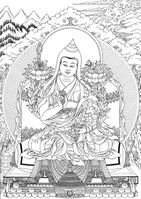Mi pham rgya mtsho: Difference between revisions
No edit summary |
m (Saved using "Save and continue" button in form) |
||
| Line 28: | Line 28: | ||
|PosWheelTurn=Third Turning | |PosWheelTurn=Third Turning | ||
|PosWheelTurnNotes=Buddha-nature is a third wheel teaching, but he holds both third and second to be of definitive meaning and integrates the two as noncontradictory in his presentation of buddha-nature as the unity of emptiness and appearance. [[Duckworth, D.]], [[Mipam on Buddha-Nature]], pp. 4-5. | |PosWheelTurnNotes=Buddha-nature is a third wheel teaching, but he holds both third and second to be of definitive meaning and integrates the two as noncontradictory in his presentation of buddha-nature as the unity of emptiness and appearance. [[Duckworth, D.]], [[Mipam on Buddha-Nature]], pp. 4-5. | ||
|PosZhenRangNotes=He seems to assert rangtong in terms of the relative and zhentong in terms of the ulitmate, as Duckworth quotes, Mipam's Lion's Roar: | |||
"First it is necessary to ascertain the lack of intrinsic nature of all phenomena in accordance with the scriptures of the protector Nāgārjuna; because if this is not known, one will not be able to ascertain the manner that relative [phenomena] are empty from their own side and the manner that the ultimate is empty of what is other. Therefore, one should first ascertain the freedom from constructs which is what is known reflexively." [[Duckworth, D.]], [[Mipam on Buddha-Nature]], p. 71. | |||
|PosEmptyLuminNotes=* "Mipam states that the basic element (Buddha-nature) is empty of adventitious defilements, yet not empty of consummate qualities. These consummate qualities are inseparable from the suchness of phenomena that is luminous clarity and self-existing wisdom." [[Duckworth, D.]], [[Mipam on Buddha-Nature]], p. 18. | |PosEmptyLuminNotes=* "Mipam states that the basic element (Buddha-nature) is empty of adventitious defilements, yet not empty of consummate qualities. These consummate qualities are inseparable from the suchness of phenomena that is luminous clarity and self-existing wisdom." [[Duckworth, D.]], [[Mipam on Buddha-Nature]], p. 18. | ||
Revision as of 11:48, 12 March 2018
| PersonType | Category:Author |
|---|---|
| MainNamePhon | Mipham Gyamtso |
| MainNameTib | མི་ཕམ་རྒྱ་མཚོ་ |
| MainNameWylie | mi pham rgya mtsho |
| AltNamesTib | མི་ཕམ་འཇམ་དབྱངས་རྣམ་རྒྱལ་རྒྱ་མཚོ་ · འཇམ་དཔལ་དགྱེས་པའི་རྡོ་རྗེ་ · འཇུ་མི་ཕམ་ |
| AltNamesWylie | mi pham 'jam dbyangs rnam rgyal rgya mtsho · 'jam dpal dgyes pa'i rdo rje · 'ju mi pham |
| YearBirth | 1846 |
| YearDeath | 1912 |
| BornIn | sde dge |
| TibDateGender | Male |
| TibDateElement | Fire |
| TibDateAnimal | Horse |
| TibDateRabjung | 14 |
| ReligiousAffiliation | Nyingma |
| StudentOf | Jamyang Khyentse Wangpo · Jamgön Kongtrul Lodrö Taye · Dpal sprul 'jigs med chos kyi dbang po · Nyoshul Lungtok Tenpai Nyima · Rdzogs chen bzhi pa mi 'gyur nam mkha'i rdo rje |
| TeacherOf | Lerab Lingpa · 'jigs med bstan pa'i nyi ma · 'gyur med pad+ma rnam rgyal · Adzom Drukpa Drodul Pawo Dorje · Nyoshul Lungtok Tenpai Nyima · Dil mgo mkhyen brtse bkra shis dpal 'byor · Pad+ma dbang mchog rgyal po |
| BDRC | https://www.tbrc.org/#!rid=P252 |
| Treasury of Lives | http://treasuryoflives.org/biographies/view/Mipam-Gyatso/4228 |
| IsInGyatsa | No |
| PosBuNayDefProv | Definitive |
| PosBuNayDefProvNotes | "Mipam explains that the last wheel’s status as the definitive meaning does not refer to everything taught in the last wheel, but specifically concerns the teaching of Buddha-nature: ...'Although the meaning of the last wheel is praised in the sūtras and commentaries, [this does] not [refer to] everything in the last wheel, but is spoken in this way concerning the definitive meaning position of demonstrating the [Buddha-]nature.' Douglas Duckworth, Mipam on Buddha-Nature, pp. 4-5. |
| PosWheelTurn | Third Turning |
| PosWheelTurnNotes | Buddha-nature is a third wheel teaching, but he holds both third and second to be of definitive meaning and integrates the two as noncontradictory in his presentation of buddha-nature as the unity of emptiness and appearance. Douglas Duckworth, Mipam on Buddha-Nature, pp. 4-5. |
| PosZhenRangNotes | He seems to assert rangtong in terms of the relative and zhentong in terms of the ulitmate, as Duckworth quotes, Mipam's Lion's Roar:
"First it is necessary to ascertain the lack of intrinsic nature of all phenomena in accordance with the scriptures of the protector Nāgārjuna; because if this is not known, one will not be able to ascertain the manner that relative [phenomena] are empty from their own side and the manner that the ultimate is empty of what is other. Therefore, one should first ascertain the freedom from constructs which is what is known reflexively." Douglas Duckworth, Mipam on Buddha-Nature, p. 71. |
| PosEmptyLuminNotes |
|
| Other wikis |
If the page does not yet exist on the remote wiki, you can paste the tag |

